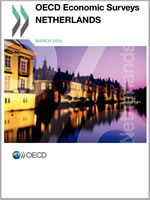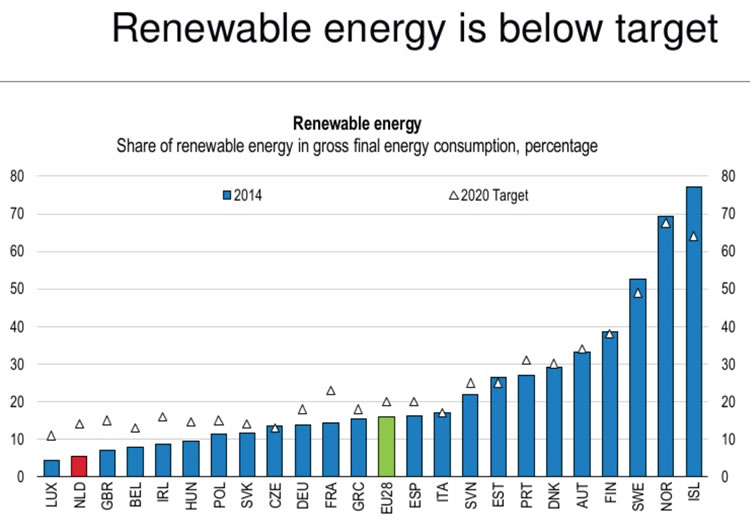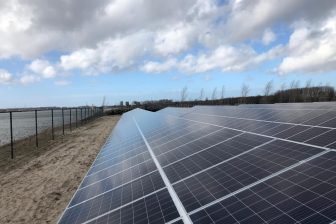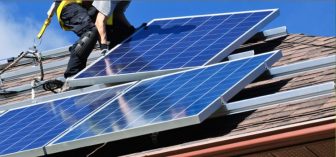
OESO positief over Nederland, maar ‘energiebeleid moet actiever’
3 maart 2016 – Opgetogen meldt minister Kamp dat Nederland ‘cum laude geslaagd is voor het landenexamen van de OESO’. De OESO complimenteert Nederland, maar plaatst ook een paar kritische kanttekeningen bij het energiebeleid.
Eerst het goede nieuws
Uit een persbericht van het ministerie van EZ
 ‘(…) De Organisatie voor Economische Samenwerking en Ontwikkeling (OESO) noemt de economische vooruitzichten voor Nederland positief. De omvang van de Nederlandse economie is weer op het niveau van voor de crisis en de groei is aangetrokken. Dit schrijft de organisatie in het OESO-landenrapport 2016. Plaatsvervangend secretaris-generaal Kapferer presenteerde het rapport aan minister Kamp van Economische Zaken.
‘(…) De Organisatie voor Economische Samenwerking en Ontwikkeling (OESO) noemt de economische vooruitzichten voor Nederland positief. De omvang van de Nederlandse economie is weer op het niveau van voor de crisis en de groei is aangetrokken. Dit schrijft de organisatie in het OESO-landenrapport 2016. Plaatsvervangend secretaris-generaal Kapferer presenteerde het rapport aan minister Kamp van Economische Zaken.
Minister Kamp: ‘Nederland is cum laude geslaagd voor het tweejaarlijkse landenexamen van de OESO. De OESO is positief over de vele hervormingen die het kabinet heeft doorgevoerd. De Nederlandse economie groeit gematigd maar aanhoudend. We staan er goed bij voor de toekomst.’
De OESO complimenteert Nederland met de hervormingen die zijn doorgevoerd sinds het vorige landenrapport van 2014. Van alle OESO-landen heeft Nederland de meeste actie ondernomen om de aanbevelingen van de OESO op te volgen. Nederland scoort ook het best op de Product Market Regulation indicator: het ondernemersklimaat in Nederland is zeer stimulerend en de overheid werpt weinig belemmeringen op.
De OESO noemt ook aandachtspunten. Nederland is een van de vier meest innovatieve landen ter wereld en om die positie te behouden adviseert de OESO meer uitgaven voor innovatie. Minister Kamp: ‘Dat is een zinnige aanbeveling. Innovatie verhoogt productiviteit en dat leidt tot hogere groei en welvaart. Ons innovatiebeleid en onze Topsectoren zorgen al voor betere samenwerking tussen bedrijven, kennisinstituten en de overheid.’ (…)’
‘Energiebeleid moet actiever’
In het persbericht van het ministerie van Economische Zaken staat helemaal niets over de kanttekeningen die de OESO maakt bij het energiebeleid. We nemen de betreffende passages over uit de samenvatting van het rapport die de OESO zelf gemaakt heeft (zonder de voetnoten).
Uit de OESO-samenvatting
‘(…)
- Investments in renewable energy
It is also necessary to boost investment in green infrastructure and support a shift towards renewable energy. Lifting investment in research and development would help the Netherlands to remain among the innovation frontrunners. (…) Recommendation: Ensure stronger investment in renewable energy and energy efficiency by improving cost-effectiveness of existing instruments and possibly increasing their scale. (…) - Energy taxes, taxes for the use of coal
Environmentally-related taxes represent nearly 3.5% of GDP, significantly more that the OECD average of about 1.5% of GDP, and constitute a large part of government revenues. However, regressive rates apply on natural gas and electricity consumption and energy taxes are significantly lower for energy-intensive firms relative to small users, particularly households. Electricity generation is covered by the European Union’s emissions trading system, but the tax exemption for the use of coal for energy production introduced in 2016 may have harmful environmental impacts which go beyond greenhouse gases. The advantageous tax treatment of diesel relative to gasoline should be eliminated. Accelerating the overdue upgrade of the tax authority’s information and communication (ICT) systems would facilitate reform implementation. (…)
- A more active and integrated eco-innovation policy is needed
Further efforts are needed to enhance investment in green innovation and clean energy. The Netherlands fell from 7th to 13th place in the European Union (EU) eco-Innovation Scoreboard (EIO, 2014), and a more active and integrated eco-innovation policy is needed to reverse this trend (OECD, 2015a). Investment in renewable energy has raised the share of renewables in gross final energy consumption to 5.5% in 2014 (CBS, 2015c), but meeting the official targets of 14% in 2020 and 16% in 2023 could be challenging. Carrying out the evaluation of support measures, planned for 2016, in a thorough, independent and transparent manner would help to make current instruments more efficient and identify where further efforts are needed. (…) - Energy efficiency of dwellings
Stepping up investment in energy efficiency improvements of dwellings would help to meet energy reduction targets. The Dutch housing stock provides ample room in this respect, and a number of funds and subsidies exist at the national level for energy efficiency improvements of both rental and owner-occupied housing. Increasing public support for energy-enhancing investments in existing housing regardless of tenure and extending it to cover new construction that replaces old dwellings would help to reduce final energy consumption by the committed 1.5% per annum, and to reach the 2020 reduction target for greenhouse gas emissions. Positive economic effects could limit the budgetary costs, although the experience of other countries indicates that the subsidies need to be carefully designed to achieve planned reductions in energy use. (…)’

Bronnen
Rijksoverheid, perbericht ministerie van EZ, 3 maart 2016: Nederland geslaagd voor landenexamen OESO
OECD, rapport, 3 maart 2016: OECD Economic Surveys: Netherlands 2016 (pdf, 120 pag.)
OECD, samenvatting, 3 maart 2016: OECD Economic Surveys: Netherlands, March 2016, Overview (pdf, 52 pag.)



